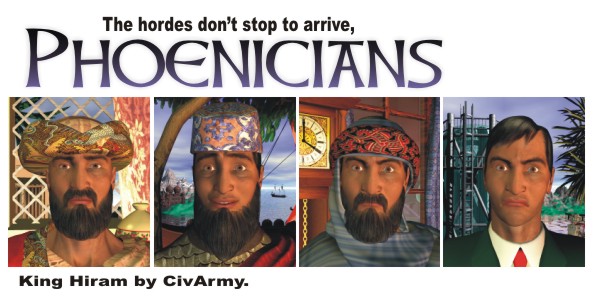CivArmy s. 1994
Deity
Civilization: Phoenicians
Bonuses: Commercial and Seafaring (Scientific)
Title and leader: King Hiram
Best/shunned government: Monarchy and Despotism
Agression: 01 (too low)
Cultural group: Mediterranian
Noun: Phoenicians
Adjective: Phoenician
Colors: Purple (Iroquois) and Pink (Arabs)
UU: Phoenician Bireme
Civilopedia entry: RACE_PHOENICIANS

Cities:
Byblos
Sidon
Tyre
Arvad
Berytus
Sarepta
Akhzib
Akko
Irqanata
Usanata
Shiana
Simirra
Kition
Sexi
Soluntum
Tharros
Tharros
Sulcis
Carteia
Motya
Panormus
Hadrametum
Sabrata
Girba
Melita
Pantelaria
Nora
Ebusos
Palma
Mago
Lixus
Military leaders:
Zakarbaal
Baalezoros
Luli
Baalu
Hasdrubal
Scientific ones:
Ithobaal
Ahiram
Hanno
Abi Baal
Baal-User
Civilopedia:
Phoenician Bireme, the UU:
This unit was done by Aaglo
It replaces galley and has one extra moviment per turn.
Bonuses: Commercial and Seafaring (Scientific)
Title and leader: King Hiram
Best/shunned government: Monarchy and Despotism
Agression: 01 (too low)
Cultural group: Mediterranian
Noun: Phoenicians
Adjective: Phoenician
Colors: Purple (Iroquois) and Pink (Arabs)
UU: Phoenician Bireme
Civilopedia entry: RACE_PHOENICIANS

Cities:
Byblos
Sidon
Tyre
Arvad
Berytus
Sarepta
Akhzib
Akko
Irqanata
Usanata
Shiana
Simirra
Kition
Sexi
Soluntum
Tharros
Tharros
Sulcis
Carteia
Motya
Panormus
Hadrametum
Sabrata
Girba
Melita
Pantelaria
Nora
Ebusos
Palma
Mago
Lixus
Military leaders:
Zakarbaal
Baalezoros
Luli
Baalu
Hasdrubal
Scientific ones:
Ithobaal
Ahiram
Hanno
Abi Baal
Baal-User
Civilopedia:
Phoenician Bireme, the UU:
This unit was done by Aaglo
It replaces galley and has one extra moviment per turn.




 About these leaders, what of them could fit for military ones?
About these leaders, what of them could fit for military ones?